Seeking Advice: New Wheelchair User
Seeking advice: new wheelchair user
I will be using a wheelchair semi-regularly the next month to see if it will help reduce pain flare-ups / baseline pain and to figure out if it's helpful for me.
Tomorrow is the first day and I am going to uni and therapy. I have only used a wheelchair a couple of times but I'm comfortable with folding it and such as my dad's disabled and it's his wheelchair I'm borrowing. In theory I know how to maneuver around but I'm nervous about it.
Do any wheelchair-users have tips/advice for new wheelchair-users?
Extra info: it's a foldable wheelchair, brand is Quickie. I'm nervous about tipping backwards (no anti-tip), going up and down curbs, taking the metro, painful hands/arms/shoulders.
More Posts from Girlish-in-pain and Others
I'm sorry, I'm trying
you will get up & you will make that to do list & you will be realistic about your limits & you will take it easy but steady & you will eat good food & you will get things done & you will move your body & you will do things that make you happy & you will limit your screen time & you will be the thing that saves you
“I don’t want to be a burden” you’re more like a relief, a gift, a blessing actually
It's not "anti-recovery" to accept that you'll never be fully abled.
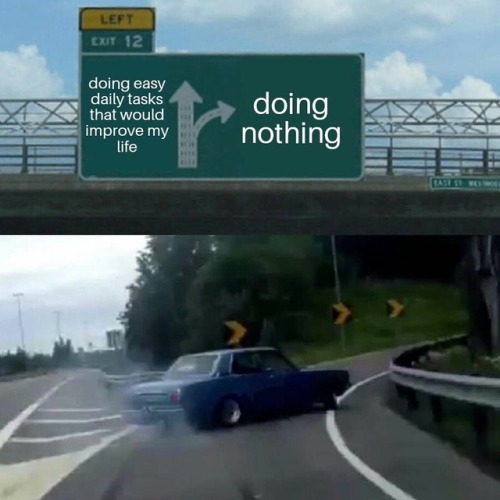





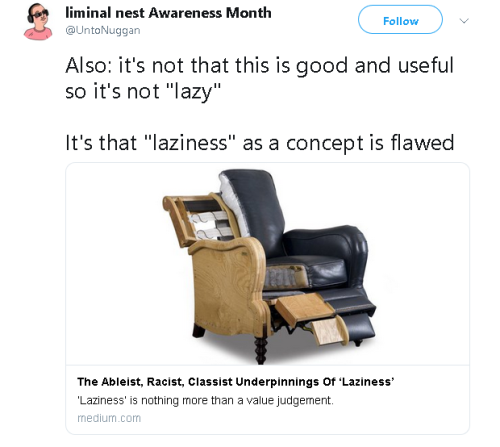
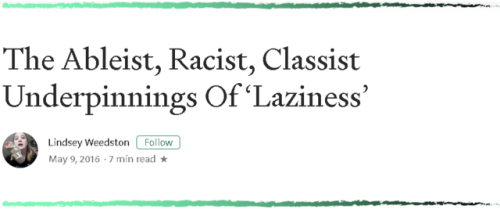

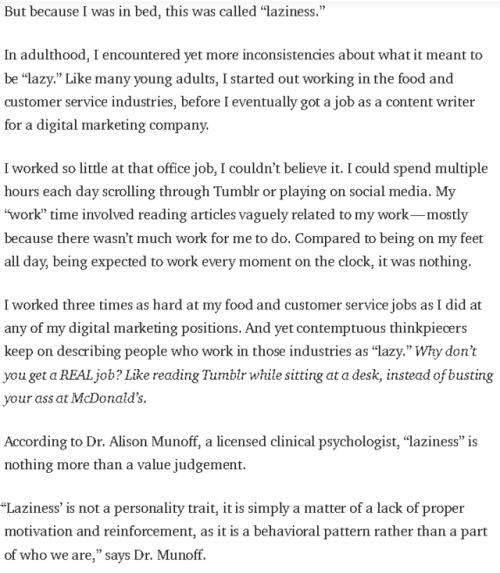
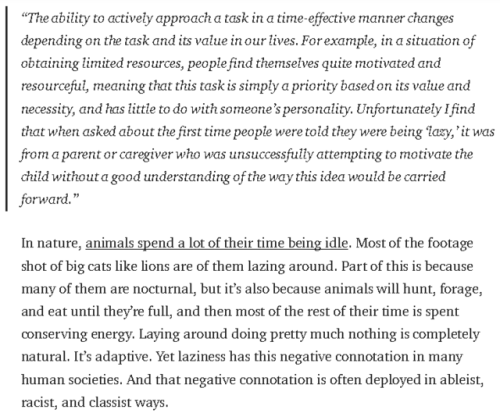


It’s easier to think of someone as “lazy” than to face the fact that school costs too much, that better jobs are inaccessible, that childcare is unaffordable, that people are forced to work so hard for so little that there’s no way they could have enough energy to attempt schooling or finding better work, and that what we give to people who can’t work is insufficient to the point of being shameful. I could say that calling people lazy is, in itself, lazy, but it’s not just an intellectual shortcut. It’s a defense mechanism.
From friends and family, to doctors, and strangers: disabled people have to face judgement, disbelief and hurtful comments. But guess what? There are so many more disabled people in the world than you realise, in fact many of us try to fake being well, because of the stigma and judgement surrounding disability.
Faking disability and illlness is rare. The 1 in 4 disabled people in the world are not rare. So next time you think about questioning someone's disability - don't. That's all.
i know this won't be available everywhere, but especially if you live in a larger city where a lot of folks are affected by opioid use/addiction, it's a really good idea to ask local pharmacies, and even food banks if they are giving out free narcan (naloxone). this can also be found at certain behavioral health offices as well, my case manager is able to get them for me for free. narcan is a life saving medication that can temporarily halt an opioid (oxycodone, hydrocodone, heroin, fentanyl, codeine, morphine, etc.) overdose while you wait for emergency medical services to arrive.
opioid overdose is distress of the respiratory system, meaning that the person overdosing likely is struggling to, or can't breathe at all. it's very important to watch to see if the person is dealing with labored or shallow breathing.
here the official use guide:


[Image ID start: Two screenshots from the FDA's Narcan (Naloxone HCl) Quick Start Guide infographic. It reads:
"Narcan (Naloxone HCl) Nasal spray quick start guide. Opioid Overdose Response Instructions.
Use NARCAN Nasal Spray (naloxone hydrochloride) for known or suspected opioid overdose in adults and children.
Important: For use in the nose only.
Do not remove or test the NARCAN Nasal Spray until ready to use.
1.) Identify Opioid Overdose and Check for Response Ask the person if they are okay and shout name.
Shake shoulders firmly and rub the middle of their chest.
Check for signs of Opioid Overdose:
Will not wake up or respond to your voice or touch
Breathing is very slow, irregular, or has stopped
Center part of their eye is very small, sometimes called "pinpoint pupils".
Lay the person on their back to receive a dose of NARCAN nasal spray.
2.) Give NARCAN nasal spray
Remove NARCAN nasal spray from the box. Peel back the tab with the circle to open the NARCAN nasal spray.
Hold the NARCAN nasal spray with your thumb at the bottom of the plunger and your first and middle fingers on either side of the nozzle.
Gently insert the tip of the nozzle into either nostril.
Tilt the person's head back and provide support under the neck with your hand. Gently insert the tip of the nozzel into one nostril, until your fingers on either side of the nozzle are against the bottom of the person's nose.
Press the plunger firmly to give the dose of NARCAN nasal spray.
Remove the NARCAN Nasal Spray from the nostril after giving the dose.
3.) Call for emergency medical help, Evaluate, and Support
Get emergency medical help right away.
Move the person on their side (recovery position) after giving NARCAN Nasal Spray
Watch the person closely.
If the person does not respond by waking up, to voice or touch, or breathing normally another dose may be given. NARCAN Nasal Spray may be dosed every 2 - 3 minutes, if available.
Repeat Step 2 using a new NARCAN Nasal Spray to give another dose in the other nostril. If additional NARCAN Nasal Sprays are available, repeat step 2 every 2 to 3 minutes until he person responds or emergency medical help is received.
For more information about NARCAN Nasal Spray go to www.narcannasalspray.com, or call 1-844-4NARCAN (1-844-462-7226)."
End image ID.]
Living with Chronic pain is so weird.
In every quiet moment there’s pain.
If some asks me how I am I usually say ‘fine’ or ‘good’ or ‘a bit tired’
because those are easier to say than ‘I’m in a lot of pain’ ‘I’m this close to passing out’ ‘if I move to quickly I will throw up’
and sometimes when people say ‘How are things going?’
I shrug and say ‘the usual’
and they assume that means everything’s fine because for them that is the usual
but for me the usual is pain.
TW sleep deprivation, derealisation, depersonalisation, hallucinations, suicidal thoughts
● ● ● ● ● ● ● ● ● ● ● ● ● ● ● ● ● ● ● ● ● ● ● ● ●
Can we talk about the effects of spending all of your formative years dealing with chronic pain? About what comes with it besides "just" the pain?
I used to routinely go days without sleeping. And I don't mean the way some people say they "didn't sleep at all last night" when actually they did sleep 2 hours. I mean no sleep at all for 3-4 ish days, I'm not sure bc my memories from that time are fuzzy (wonder why). The pain kept me up night after night. And it wasn't until the overwhelming urge to sleep finally won over the pain that I would be able to sleep.
Do you know what happens when you go without sleep for too long?
At first, you're just more tired than usual, it gets harder to concentrate, you get snappy easier. Then it'll feel like everything is too loud or slightly shushed like you're in a bubble, it's hard to focus your eyes properly, the ground and the walls get squiggly. Obviously, the pain you already have gets exponentially worse but also different, heavier.
If you are awake still, you'll start to have micro sleeps. That's when your brain shuts down briefly for a micro second while you're awake bc it fucking needs to sleep. Time feels weird, stretching and shrinking in on itself. It won't feel real. You won't feel real. You'll forget basic shit like your own name.
It varies from person to person how long you have to go without sleep before the visual and auditory hallucinations start. But if you're awake for long enough, they will start. Whispers of your name when you're alone, songs playing when there's no music on, shadow people in your peripheral vision.
Maybe you'll think about killing yourself just to make it stop. Maybe you don't even think killing yourself would mean death, but instead you belive you'll wake up and everything will be back to normal. Your ability to reason, to think logically will twist.
Eventually, the urge to sleep will be greater than the pain and finally you will get to rest.
I understand all too well why sleep deprivation is used as torture.
In what universe does experiencing this countless of times when you're a literal teenager not affect you when you're an adult. Even when it doesn't happen anymore bc of semi proper pain management and meds to sleep. It haunts me. Still.

about chronic illness and the constant search for blame.
everyone tells you this shit constantly until you start to believe it, and every time it flares up you wonder what you did wrong. on top of the pain, fatigue, and everything else, it starts to feel like a personal failing — like you just aren’t trying hard enough, even if you’re trying as hard as you possibly can just to get through the day.
-
 vampirepuppyboyfag liked this · 8 months ago
vampirepuppyboyfag liked this · 8 months ago -
 girlish-in-pain liked this · 1 year ago
girlish-in-pain liked this · 1 year ago -
 girlish-in-pain reblogged this · 1 year ago
girlish-in-pain reblogged this · 1 year ago -
 girlish-in-pain reblogged this · 1 year ago
girlish-in-pain reblogged this · 1 year ago -
 mercygetbackhere liked this · 1 year ago
mercygetbackhere liked this · 1 year ago -
 nokoda liked this · 1 year ago
nokoda liked this · 1 year ago -
 midnight-soulless-system liked this · 1 year ago
midnight-soulless-system liked this · 1 year ago -
 princetonspotatoes liked this · 1 year ago
princetonspotatoes liked this · 1 year ago -
 of-void-and-stars liked this · 1 year ago
of-void-and-stars liked this · 1 year ago -
 aspirationatwork reblogged this · 1 year ago
aspirationatwork reblogged this · 1 year ago -
 k4saneterritory reblogged this · 1 year ago
k4saneterritory reblogged this · 1 year ago -
 k4saneterritory reblogged this · 1 year ago
k4saneterritory reblogged this · 1 year ago -
 table-official liked this · 1 year ago
table-official liked this · 1 year ago -
 rinnosetti reblogged this · 1 year ago
rinnosetti reblogged this · 1 year ago -
 theboybrickwithoutastick liked this · 1 year ago
theboybrickwithoutastick liked this · 1 year ago -
 casscadia reblogged this · 1 year ago
casscadia reblogged this · 1 year ago -
 casscadia liked this · 1 year ago
casscadia liked this · 1 year ago -
 disconnectivetissue reblogged this · 1 year ago
disconnectivetissue reblogged this · 1 year ago -
 girlish-in-pain reblogged this · 1 year ago
girlish-in-pain reblogged this · 1 year ago -
 disconnectivetissue reblogged this · 1 year ago
disconnectivetissue reblogged this · 1 year ago -
 girlish-in-pain reblogged this · 1 year ago
girlish-in-pain reblogged this · 1 year ago -
 girlish-in-pain reblogged this · 1 year ago
girlish-in-pain reblogged this · 1 year ago

24, they/them, nonbinary lesbian, disabled. Studying medicine, working on my internalised ableism, prioritising finding out what I like to do. I write, ish, or try to at least and that's something
163 posts